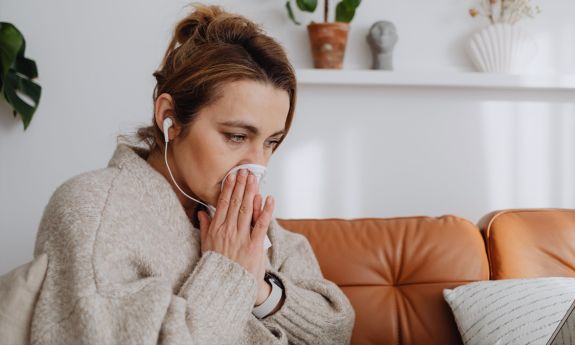Q&A: How to Stay Healthy as COVID and Flu Cases Rise
With COVID-19, influenza and RSV surging, here are tips for this winter

We spoke with Duke Employee Occupational Health & Wellness (EOHW) Executive Director Dr. Carol Epling to learn about the current threats posed by influenza, COVID-19 and RSV, and what we can do to keep ourselves, and those around us healthy this winter.
What is happening with COVID, Influenza and RSV right now?

The winter months, especially the weeks following the holidays, have traditionally seen rises in cases of respiratory illness. Epling said that this year is no different, though with the combination of influenza, COVID and RSV, which can be dangerous for infants and older adults, the threat deserves our attention.
“It’s been a very busy period with COVID case counts, but overall the numbers aren’t as high as last year,” Epling said. “This will be our fourth flu season when we’ve also had circulating COVID and we’ve seen a rise in cases around this time in each of those years. It’s because people are getting together more frequently for celebrations and eating together and fewer people are wearing masks. We’re giving ourselves a lot more opportunities to be exposed to one another and transmit these respiratory viruses,”
Epling also said the JN.1 variant of COVID-19, which is the one responsible for most current cases, is especially transmissible.
“We know that COVID is here to stay, so it’s just added to the usual wintertime virus season,” Epling said.
How Can You Stay Healthy?
Epling pointed out that vaccinations are the best way to prevent a case of influenza or COVID-19 from becoming severe. And with both COVID and flu vaccines beginning to provide protection roughly two weeks after receiving them, getting them now can still keep you safe during much of the busy season for flu and COVID activity.
The updated COVID-19 vaccine, which became available in September, provides effective protection from omicron-related strains of the virus, and is effective against the current JN.1 variant.
“The benefits of the vaccine to prevent severe illness, hospitalization and death from COVID are holding up,” Epling said.
The updated COVID-19 vaccine is available through your health care provider – including by appointment at all Duke Primary Care locations and Clinic 1J in Duke South Clinics – or through pharmacies. The vaccinations are fully covered on all of Duke’s employee medical plans.
Flu vaccines are also available at most primary care clinics and pharmacies. Walk-in influenza vaccinations are available at no-cost for Duke faculty and staff at all three EOHW clinics, including the EOHW location in the Duke South Clinic Orange Zone, Sub-Basement Level, between 8 a.m.-4:30 p.m. on weekdays, except on Wednesday from noon-2 p.m.
“If you haven’t gotten a flu vaccine yet, I encourage you to do it,” Epling said. “The flu is very active right now.”
According to CDC estimates, there have already been 6,500 flu deaths in the U.S. this season.
What should you do if you feel sick?
If you’re experiencing common respiratory illness symptoms such as a fever, cough, sore throat, nasal congestion or fatigue, or you if you’ve been in close contact with someone who tested positive for COVID-19, test yourself for COVID-19 with a commonly available at-home rapid antigen test kit or self-schedule a testing appointment online.
Staff and faculty can also find guidance and set up a testing appointment by calling the Duke Employee Exposure Hotline at 919-385-0429, option 1. The hotline is available from 8 a.m.-5 p.m. on weekdays and from 8 a.m.-noon on weekends.
Every home in the U.S. is eligible to order four free at-home tests as of November 20, 2023. If you did not order four tests earlier in the fall, you can place two orders for a total of 8 tests.
If you test positive for COVID-19, Epling recommends isolating from others for at least five days. In addition to the mandatory five-day isolation period, you must have improving symptoms with absence of fever, diarrhea or vomiting for at least 24 hours prior to return to the workplace. You must also wear a well-fitting mask for 10 days after symptom onset to minimize risk to others.
Contacting EOHW after a positive test will also help connect you with helpful information about next steps and potential treatment options.
If an at-home test is negative, but you’re experiencing flu-like or persistent respiratory illness symptoms, Epling recommends staying home and making an appointment for further testing.
“If your at-home test is negative, you still may have COVID,” Epling said. “The molecular tests collected at the employee swabbing clinic at Duke Medicine Pavilion and at primary care or urgent care clinics can give a more accurate test result for COVID. And at the same time, you may get tested for influenza and RSV. If you have risk factors for serious illness these tests will help you know if there are preventative actions or medications available which could help treat you.”
The CDC provides additional information on understanding the differences between flu and COVID-19.
Send story ideas, shout-outs and photographs through our story idea form or write working@duke.edu.
Follow Working@Duke on X (Twitter), Facebook, and Instagram.